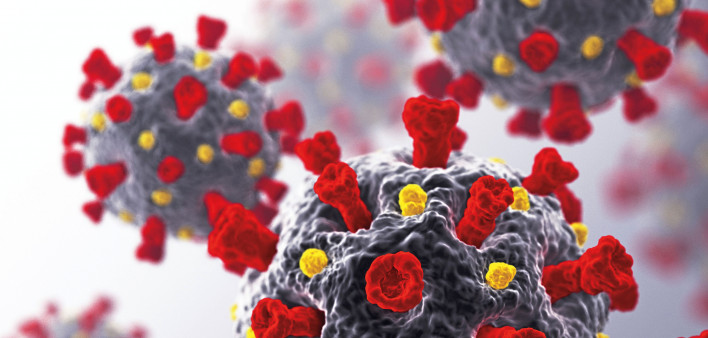The association between COVID-19 and tenofovir, an antiviral widely used for HIV and hepatitis B treatment as well as HIV pre-exposure prophylaxis (PrEP), has spurred speculation since the early days of pandemic. The latest study results, presented this week at the EASL International Live Congress, show that people with chronic hepatitis B who take tenofovir appear to have a lower risk for severe COVID-19.
Early on, small studies and anecdotal reports suggested that people living with HIV were no more likely to acquire SARS-CoV-2, the coronavirus that causes COVID-19, or to develop severe illness. (Later studies, however, suggested that they are at a modestly greater risk for severe disease.) This led many to wonder whether antiretroviral drugs used for HIV treatment or prevention might protect against the new coronavirus.
Tenofovir disoproxil fumarate, or TDF (sold alone as Viread and a component of several HIV combination pills including Truvada) and tenofovir alafenamide, or TAF (sold alone as Vemlidy for hepatitis B and a component of HIV coformulations including Descovy) show activity against SARS-CoV-2 in laboratory studies. But this is true of many antivirals, and it doesn’t necessarily mean they can prevent or treat COVID-19 in the real world.
Last year, Spanish researchers reported that among 77,590 HIV-positive people on antiretroviral treatment, those taking Truvada or a generic equivalent were about half as likely to be diagnosed or hospitalized with COVID-19 as people taking other antiretrovirals. No one taking Truvada was admitted to the intensive care unit (ICU) or died. A similar association was not seen for Descovy. However, only a small proportion of people in the analysis were taking either drug.
Another Spanish study showed that people using Truvada or Descovy for PrEP were significantly more likely to test positive for SARS-CoV-2 antibodies compared with nonusers (15% versus 9%)—perhaps because they were having more sex. (Although the coronavirus is not known to be directly sexually transmitted, it can spread through the air during sex and probably can be transmitted via kissing.) Truvada users were less likely to develop symptomatic COVID-19 and had a shorter duration of symptoms, but these differences were not statistically significant. Yet four of the five people hospitalized with COVID-19 were taking PrEP, including one Descovy user who was admitted to the ICU.
Studies of the links between tenofovir use, SARS-CoV-2 infection and COVID-19 severity among people with HIV in several other countries have not seen significant associations.
Now, a new study out of Spain looks at the link between treatment with tenofovir and COVID-19 outcomes among people with chronic hepatitis B.
Beatriz Mateos Muñoz, MD, PhD, of Hospital Universitario Ramón y Cajal in Madrid, and colleagues looked at the incidence and severity of COVID-19 among hepatitis B patients taking TDF or another antiviral, entecavir (Baraclude). These medications can control hepatitis B virus replication, but they usually do not lead to a cure and are often taken long term.
Searching medical records for 4,736 adults with chronic hepatitis B treated at 28 Spanish hospitals between February 1 and November 30, 2020, the researchers identified 117 people (2.5%) with COVID-19. Of these, 67 were taking TDF and 50 were on entecavir. Those taking entecavir were substantially more likely to have obesity, diabetes, hypertension and other comorbidities associated with worse COVID-19 outcomes.
Forty-one people with COVID-19 (35%) were hospitalized, five (4.3%) were admitted to the ICU and six (5.1%) died. The incidence of COVID-19 was similar for people taking TDF or entecavir, but those on TDF were less likely to have severe COVID-19 (6% versus 36%), be admitted to the ICU (0% versus 10%) or require mechanical ventilation (3% versus 20%). TDF recipients also had a shorter duration of hospitalization (three versus 11 days) and were less likely to die (one versus five deaths, or 1.5% versus 10%). All of these associations, except for deaths, were statistically significant. After adjusting for age, sex, obesity, other comorbidities and liver fibrosis stage, TDF was associated with a sixfold reduction in the risk for severe COVID-19.
“Patients with chronic hepatitis B on TDF have a lower risk of severe COVID-19 infection than those on entecavir,” the researchers concluded. “TDF seems to exert a protective effect in patients with chronic hepatitis B infected by COVID-19.”
Speaking at a conference press briefing, Muñoz suggested that such a protective effect—if it in fact exists—could be attributable to tenofovir’s activity against the SARS-CoV-2 polymerase enzyme or more general anti-inflammatory or immunomodulatory effects.
Click here for more reports from the International Liver Congress.
For more news about COVID-19, visit COVID Health.com.







Comments
Comments